Dollhouse: Season One Blu-ray Movie
HomeDollhouse: Season One Blu-ray Movie 
20th Century Fox | 2009 | 694 min | Rated TV-14 | Jul 28, 2009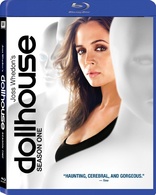
Movie rating
7.5 | / 10 |
Blu-ray rating
| Users | 4.2 | |
| Reviewer | 3.5 | |
| Overall | 3.7 |
Overview
Dollhouse: Season One (2009)
The Dollhouse is a very secret, and very illegal, place where wishes come true. Clients with the right connections and enough money can hire "Actives", people who have been programmed to perfectly fulfill the needs, and desires of their clients. The Actives are people who have chosen, for their own reasons, to surrender their bodies and minds for a five-year stay in the Dollhouse. Now they can be imprinted with any personality, skill, or even muscle memory. They can be the perfect companion, lover, spy, assassin; and when the job is done they forget everything. But something is wrong with the Active called "Echo". No longer just a blank slate waiting for her next assignment, Echo is remembering flashes of the lives that she has lived and the games she has played, and she is starting to wonder just who she really is...
Starring: Eliza Dushku, Harry Lennix, Tahmoh Penikett, Enver Gjokaj, Olivia WilliamsDirector: Joss Whedon
| Sci-Fi | Uncertain |
| Mystery | Uncertain |
| Thriller | Uncertain |
| Drama | Uncertain |
Specifications
Video
Video codec: MPEG-4 AVC
Video resolution: 1080p
Aspect ratio: 1.78:1
Original aspect ratio: 1.78:1
Audio
English: DTS-HD Master Audio 5.1
Subtitles
English, French, Portuguese, Spanish
Discs
50GB Blu-ray Disc
Three-disc set (3 BDs)
Playback
Region free
Review
Rating summary
| Movie | 4.0 | |
| Video | 3.5 | |
| Audio | 3.5 | |
| Extras | 2.5 | |
| Overall | 3.5 |
Dollhouse: Season One Blu-ray Movie Review
A solid first outing earns a decent high definition release...
Reviewed by Kenneth Brown July 31, 2009True to tragic, well-documented form, creator extraordinaire Joss Whedon's latest television endeavor -- the aptly titled but terribly mishandled Dollhouse -- has encountered a slew of problems since its inception. After being relegated to Fox's Friday night dead zone, it got off to a shaky start, struggled to attract viewers, and suffered from The Sarah Connor Chronicles' plummeting lead-in numbers. Will it gain enough of an audience in its second season to warrant a third? It's impossible to tell, but if its first season is any indication, it would be an absolute shame to see Whedon's Dollhouse meet the same fate as some of his previous projects.
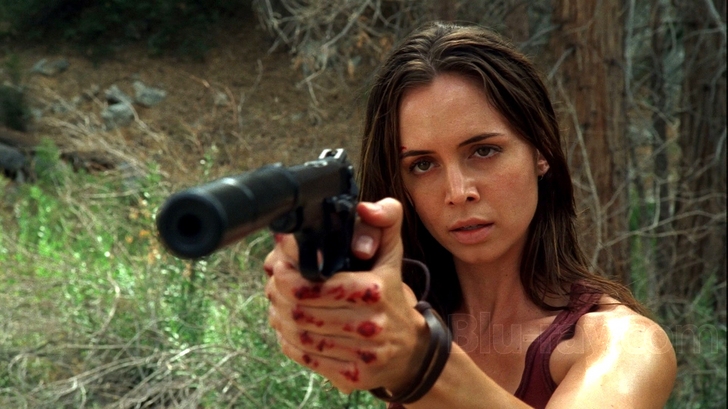
Dushku helms the series, but it's her castmates who steal the show...
Buffy alum Eliza Dushku returns to the Whedon fold as Echo, a woman who accepts a job as a Doll -- a living, breathing blank slate that can be imprinted with whatever identity, personality, and attributes her superiors require. She joins a legion of docile Dolls (henceforth referred to by their proper title: Actives) employed by the Dollhouse, a secret corporation that provides a variety of services to the world's most powerful individuals. Over the course of Season One's thirteen episodes, she's transformed into a hostage negotiator, several men's true loves, a backup singer, a visually impaired cult member, an internal investigator, and more. But Echo isn't acting... she truly believes she is whatever person her handlers have temporarily made her to be. If she's imprinted with the personality of a master thief, she takes on all the characteristics, mannerisms, and skill-sets her clients expect. Likewise, if an assignment requires a weak and helpless innocent, she's altered to fit the bill. Of course, Actives aren't just tossed to the wolves. While on assignment, Echo is constantly monitored by her Handler, a former police officer named Boyd Langton (Harry Lennix), and the eccentric technician responsible for designing the Actives' various personalities, Topher Brink (Fran Kranz).
Thankfully, Echo is just a secondary character in a much larger story; an anchor-point of sorts used to introduce other, more interesting figures in the Dollhouse. In addition to Langton and Topher, both of whom become key players in the mix, Whedon gives us Paul Ballard (Tahmoh Penikett), an unwavering special agent obsessed with proving Actives exist; Adelle DeWitt (Olivia Williams), the director of the Los Angeles Dollhouse (that's right, there's more than one); Laurence Dominic (Reed Diamond), her cold-hearted Head of Security; Victor (Enver Gjokaj) and Sierra (Dichen Lachman), two Actives who begin developing feelings for each other; Joe Hearn (Kevin Kilner), a shady Handler; and Dr. Claire Saunders (Amy Acker), a physician who was attacked by a rogue Active dubbed Alpha (I won't reveal who plays Alpha since his identity is Season One's biggest mystery, but I will say the familiar Whedonite who fills his shoes delivers a devilishly delicious performance). By the time Echo and some of her fellow Actives begin to exhibit signs of self-awareness, Dushku has taken a gracious back seat to her lesser known castmates, allowing Dollhouse to become a well-assembled ensemble piece that, along with Firefly and Buffy, demonstrates Whedon's knack for casting.
I have to admit, the first four episodes of Dollhouse had me worried. By focusing on Echo's assignment-of-the-week shenanigans, I was initially concerned the series was going to devolve into the same repetitive patterns that have sullied other fan-favorite television shows. To his credit though, it seems Whedon was well aware of its shortcomings. Beginning with "True Believer" (and, to an extent, "Gray Hour"), he shifts his focus from Echo to Ballard's investigation and the challenges and moral quandaries faced by the staff of the Dollhouse. With each passing episode, the series finds its footing, digs in, and offers up some truly memorable twists and turns, placing it on my list of must-see Fall TV shows. Whedon doesn't simply weave a solid science fiction story or pepper it with his patented parade of pithy dialogue, he provides a welcome dose of social commentary on materialism, superficiality, and our growing obsession with identity. The cast is just as strong (particularly Penikett, Williams, Lennix, Kranz, Acker, and he-who-plays-Alpha), matching Whedon's pen with enough wit and personality to keep the show afloat through its staggering start.
But even if its official finale ("Omega") leaves you with lingering doubts about Whedon's vision or the direction of the show, be sure to soak up "Epitaph One," Season One's magnificent unaired thirteenth episode. It not only changed my entire perception of the Dollhouse and its inhabitants, it opens up a world of bleak possibilities and endless potential; a post-apocalyptic glimpse into the future that brings the series' themes to a very practical, very dismal head. It also stands as one of Whedon's finest -- not just his strongest Dollhouse episode, but one of the best episodes of television he's ever produced. Everything, from its characters to its plot to its stunning developments, is on point; everything made me hungry for a second season and desperate to see Whedon earn third, fourth, and fifth outings (if for no other reason than so I could eventually watch an "Epitaph Two," "Epitaph Three," "Epitaph Four," and so on).
I have no intention of raving about Dollhouse or declaring it the next Lost or Battlestar Galactica. I'll be the first to point out its problems and say that it still has a lot to prove. However, by the end of Season One, I was hooked. If you can plow through its opening struggles and push past its initial four-episode volley, I'm confident you'll feel the same. Here's hoping its second season picks up right where the first leaves off. Here's hoping Fox doesn't drop the proverbial ax on Whedon's neck yet again. Here's hoping we get more Dollhouse, an intriguing, captivating action-thriller that promises to pack more of everything into its next thirteen episodes.
Dollhouse: Season One Blu-ray Movie, Video Quality 
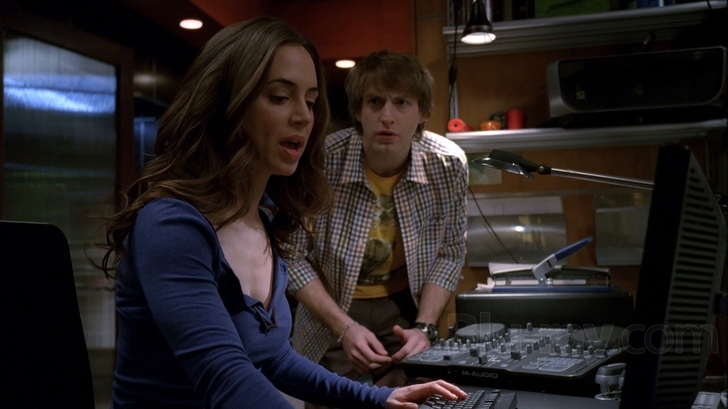
Dollhouse: Season One features an oft-times memorable, at-times problematic 1080p/AVC MPEG-4 encode that obliterates the standard DVD's muddy presentation but falls short of the best television transfers on the market. First, the good. The series' lush palette looks amazing in high definition, boasting bold primaries, exceedingly natural skintones, and inky, well-resolved blacks. It helps that contrast is both commanding and consistent, while shadow delineation remains convincing and revealing throughout. Image depth is also impressive, blessing each episode with a polished, three-dimensional appearance that's sure to draw fans deeper into the Dollhouse than they've ever been before. More importantly, the picture is clean and proficient -- I didn't notice any significant artifacting, banding, aliasing, or pesky source noise.
That being said, fine detail is somewhat soft and texture definition waxes and wanes from scene to scene. I have no doubt many of the presentation's inconsistencies are the product of Whedon's ever-changing lighting schemes and specific creative intentions, but I also suspect noise reduction has been applied to the transfer itself (many close-ups are plagued by spongy facial textures). Artificial sharpening has been used to counteract any negative side effects, but it's too obvious and intrusive for my tastes. All in all, Dollhouse: Season One looks pretty good (even great by some standards), easily bests the DVD version and, for the most part, succeeds.
Dollhouse: Season One Blu-ray Movie, Audio Quality 
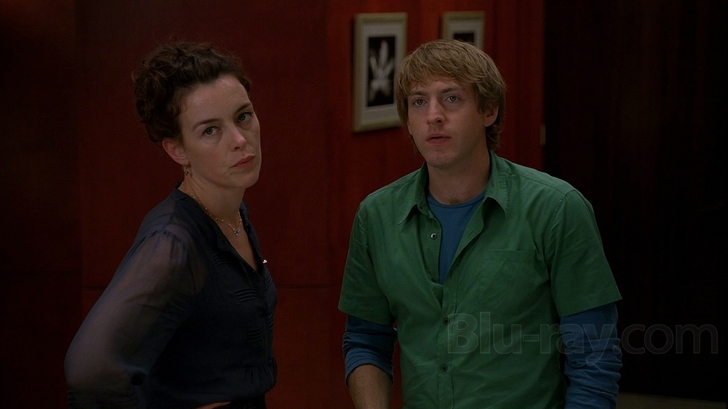
I only have one issue with Dollhouse: Season One's DTS-HD Master Audio 5.1 surround track, but it involves a rather fundamental problem that becomes a frequent distraction. While dialogue is generally as crisp and intelligible as I'd expect from a newly minted lossless audio track, it sometimes sounds flat and lifeless; as if it's being delivered on the other side of a plexiglass window. Compare Adelle and Mr. Dominic's muffled inner-office conversations in "Needs" to the crystal clear banter between Echo and her rebellious companions in the very same episode. The discrepancy is quite apparent and, more distressingly, occurs several times in all thirteen episodes. Chalk it up to poor prioritization or overzealous LFE support (which tends to favor dull rumbles over sharp impacts), but the result is an annoying and perplexing disruption to an otherwise pleasant sonic experience.
Luckily, the problem is the exception rather than the rule. Most character exchanges sound fine, effortlessly mingling with the series' action-oriented elements, pulse-pounding musical score, and more subdued encounters. Moreover, rear speaker activity is aggressive (particularly during Echo's more explosive missions), the soundfield is immersive (the track's ambient effects and acoustic properties are noteworthy), and directionality is accurate and involving, offering plenty of easy, breezy, beautiful pans. All things considered, Dollhouse: Season One's DTS-HD Master Audio track is an effective one. It certainly isn't perfect -- the tonal consistency of the dialogue and the heavy-handed nature of the LFE channel may even warrant a lower score -- but it easily outperforms the DVD's lossy mix and, more often than not, delivers an experience fans will enjoy.
Dollhouse: Season One Blu-ray Movie, Special Features and Extras 
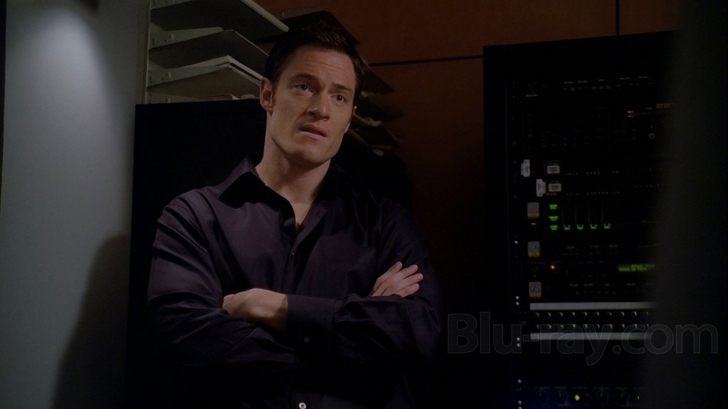
The 3-disc Blu-ray edition of Dollhouse: Season One features the same supplemental package as its standard DVD counterpart, but presents all of the video content in high definition. Unfortunately, it doesn't amount to much. Aside from two unaired episodes (the original pilot and a thirteenth official episode) and a fantastic twenty-minute behind-the-scenes featurette, nearly everything else -- yep, even Joss Whedon's commentary -- is fairly shallow and unsatisfying.
- Audio Commentaries: Each disc has a full-length audio commentary, but two of the three tracks are tough to find (you have to click on their corresponding episodes before the appropriate option appears). "Ghost" offers the most intriguing track -- one that features Dollhouse mastermind Joss Whedon and series star Eliza Dushku -- but it isn't nearly as informative or entertaining as Whedon's Firefly or Serenity commentaries. Not only did Whedon and Dushku record their chat early in the morning (which results in endless tangents about their personal lives, Joss's grumbling stomach, and a bowl of strawberries), they tend to joke and giggle their way through the episode, focusing on their friendship more than the series or its production.
Writers Jed Whedon and Maurissa Tancharoen do a better job discussing "Man on the Street" and "Epitaph One," but sound a bit uncomfortable in the recording booth. They tend to narrate the on-screen events, inject random anecdotes on occasion, and sometimes serve up the same sort of tedious chatter that frequents Joss and Eliza's sit-down. - Making Dollhouse (HD, 21 minutes): Thankfully, Joss Whedon's engrossing, incredibly candid behind-the-scenes documentary is far more compelling than the three audio commentaries combined. With a rapidfire collection of interview segments and fly-on-the-wall production footage, it covers the development of the project, the poor timing of the Writer's Strike (and its affect on the show), casting, debates between the creators and the studio, and the creation of a second pilot (after Fox deemed the first pilot dry and confusing). Whedon wryly admits to culling Battlestar Galactica's ranks to score Tahmoh Penikett, discusses the series terminology and storyline, explains the reasons he chose each actor, describes the manner in which his original vision evolved as the studio continually pushed him to "make it bigger," and talks about the cast's anxiety during the pilot fiasco.
Just be careful: the documentary reveals a MAJOR spoiler about the season finale and the identity of the series' villain, Alpha. If you haven't seen every episode, approach this one with caution! - Deleted Scenes (HD, 30 minutes): A generous collection of deletions and extensions trimmed from both pilots, key episodes, and the finale. While many of the scenes are less than fifteen seconds long, they still fill in enough gaps to appeal to fans of the series.
- A Private Engagement (HD, 6 minutes): This quickie asks, "what if the technology of Dollhouse actually existed?" Various members of the cast and crew offer answers, revealing whether they would take advantage of the tech, agree to be dolls, or consider using such a service.
- Coming Home (HD, 7 minutes): Glossy, sappy, and sugary sweet, this secondary featurette gives the cast and crew an opportunity to reveal their unabashed love of all things Whedon.
- Finding Echo (HD, 5 minutes): More compliments are paid, this time between Whedon and Dushku, as the series creator and star fawn over each other's talents.
- Designing the Perfect Dollhouse (HD, 6 minutes): Whedon gives a tour of the Dollhouse, discusses its design, its adherence to his original vision, and a variety of nuances you might have missed.
- Original Unaired Pilot (HD): While elements of Whedon's first pilot are impressive, the official pilot is leaner, more intense and, ultimately, more satisfying.
- Unaired Bonus Episode (HD): It isn't exactly a supplement or special feature but, as I already mentioned, "Epitaph One" is a fantastic addition to this release and the series proper. Be sure to check it out.
Dollhouse: Season One Blu-ray Movie, Overall Score and Recommendation 
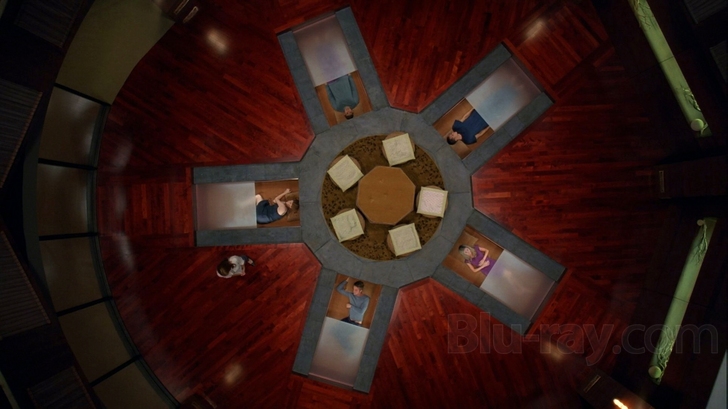
I can't vouch for Dollhouse's future, but I can say its first season is a strong one. Whedon does what Whedon does best, building toward a startling conclusion that made me want to dig into Season Two post haste. Unfortunately, Season One's Blu-ray release is more problematic. Its video transfer is stilted, its DTS-HD Master Audio track isn't as polished as I hoped it would be, and its supplemental package leaves a lot to be desired. Still, Dollhouse: Season One is worth your consideration, time and, ultimately, money. Give it a shot and see if you're as intrigued by its first season as I was.
Similar titles
Similar titles you might also like

Fringe: The Complete Series
2008-2013

V: The Complete Second Season
2011

400 Days
2015

12 Monkeys: The Complete Series
2015-2018

Blade Runner 2049 4K
2017

Contact
1997

Westworld: The Complete Series
2016-2022

Arrival 4K
2016

Childhood's End
2015

Fahrenheit 451
2018

Self/Less
2015

The Prestige 4K
2006

Extant: The First Season
2014

The Expanse: The Complete Series
2015-2022

Ex Machina 4K
2015

Atlas Shrugged: Part I
2011

Captive State
2019

THX 1138
The George Lucas Director's Cut
1971

Rememory
2017

Atlas Shrugged Part III: Who Is John Galt?
2014
